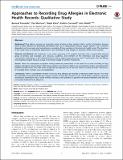| dc.contributor.author | Fernando, Bernard | en_US |
| dc.contributor.author | Morrison, Zoe | en_US |
| dc.contributor.author | Kalra, Dipak | en_US |
| dc.contributor.author | Cresswell, Kathrin | en_US |
| dc.contributor.author | Sheikh, Aziz | en_US |
| dc.date.accessioned | 2014-05-06T16:18:00Z | |
| dc.date.issued | 2014 | en_US |
| dc.identifier.citation | Fernando, Bernard, Zoe Morrison, Dipak Kalra, Kathrin Cresswell, and Aziz Sheikh. 2014. “Approaches to Recording Drug Allergies in Electronic Health Records: Qualitative Study.” PLoS ONE 9 (4): e93047. doi:10.1371/journal.pone.0093047. http://dx.doi.org/10.1371/journal.pone.0093047. | en |
| dc.identifier.issn | 1932-6203 | en |
| dc.identifier.uri | http://nrs.harvard.edu/urn-3:HUL.InstRepos:12152957 | |
| dc.description.abstract | Background: Drug allergy represent an important subset of adverse drug reactions that is worthy of attention because many of these reactions are potentially preventable with use of computerised decision support systems. This is however dependent on the accurate and comprehensive recording of these reactions in the electronic health record. The objectives of this study were to understand approaches to the recording of drug allergies in electronic health record systems. Materials and Methods We undertook a case study comprising of 21 in-depth interviews with a purposefully selected group of primary and secondary care clinicians, academics, and members of the informatics and drug regulatory communities, observations in four General Practices and an expert group discussion with 15 participants from the Allergy and Respiratory Expert Resource Group of the Royal College of General Practitioners. Results: There was widespread acceptance among healthcare professionals of the need for accurate recording of drug allergies and adverse drug reactions. Most drug reactions were however likely to go unreported to and/or unrecognised by healthcare professionals and, even when recognised and reported, not all reactions were accurately recorded. The process of recording these reactions was not standardised. Conclusions: There is considerable variation in the way drug allergies are recorded in electronic health records. This limits the potential of computerised decision support systems to help alert clinicians to the risk of further reactions. Inaccurate recording of information may in some instances introduce new problems as patients are denied treatments that they are erroneously believed to be allergic to. | en |
| dc.language.iso | en_US | en |
| dc.publisher | Public Library of Science | en |
| dc.relation.isversionof | doi:10.1371/journal.pone.0093047 | en |
| dc.relation.hasversion | http://www.ncbi.nlm.nih.gov/pmc/articles/PMC3989180/pdf/ | en |
| dash.license | LAA | en_US |
| dc.subject | Biology and Life Sciences | en |
| dc.subject | Immunology | en |
| dc.subject | Clinical Immunology | en |
| dc.subject | Allergies | en |
| dc.subject | Computer and Information Sciences | en |
| dc.subject | Computer Applications | en |
| dc.subject | Medicine and Health Sciences | en |
| dc.subject | Clinical Medicine | en |
| dc.subject | Health Care | en |
| dc.subject | Health Care Policy | en |
| dc.subject | Health Risk Analysis | en |
| dc.subject | Pharmacology | en |
| dc.subject | Adverse Reactions | en |
| dc.subject | Database and Informatics Methods | en |
| dc.subject | Health Informatics | en |
| dc.subject | Clinical Research Design | en |
| dc.subject | Survey Research | en |
| dc.title | Approaches to Recording Drug Allergies in Electronic Health Records: Qualitative Study | en |
| dc.type | Journal Article | en_US |
| dc.description.version | Version of Record | en |
| dc.relation.journal | PLoS ONE | en |
| dash.depositing.author | Sheikh, Aziz | en_US |
| dc.date.available | 2014-05-06T16:18:00Z | |
| dc.identifier.doi | 10.1371/journal.pone.0093047 | * |
| dash.contributor.affiliated | Sheikh, Aziz | |


